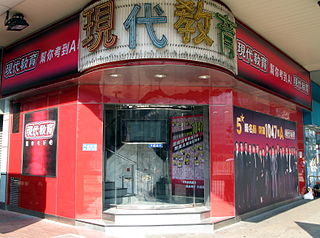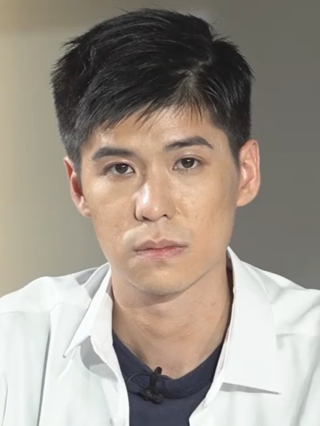
Wah Yan College Kowloon is a Catholic secondary school for boys run by the Chinese Province of the Society of Jesus. It is located in Kowloon, Hong Kong and is a grant-in-aid secondary school using English as the primary medium of instruction. The total land area of its campus is among the largest for Hong Kong secondary schools, and it's one of the most prestigious schools in Hong Kong.

Sha Tau Kok is a closed town in Hong Kong. It is the last remaining major settlement in the Frontier Closed Area and is Hong Kong's northernmost town.

Wah Yan College, Hong Kong also referred to by its acronym WYHK, is a Catholic all-boys grant-in-aid secondary education institution run by the Society of Jesus in Wan Chai, Hong Kong. It was founded by Peter Tsui on 16 December 1919. It was a non-sectarian school when it was founded, and the Jesuits took over the operation of the school in 1932.
A cram school is a specialized school that trains its students to achieve particular goals, most commonly to pass the entrance examinations of high schools or universities. The English name is derived from the slang term cramming, meaning to study a large amount of material in a short period of time. The word "crammer" may be used to refer to the school or to an individual teacher who assists a student in cramming.
The Hong Kong Certificate of Education Examination was a standardised examination between 1974 and 2011 after most local students' five-year secondary education, conducted by the Hong Kong Examinations and Assessment Authority (HKEAA), awarding the Hong Kong Certificate of Education secondary school leaving qualification. The examination has been discontinued in 2012 and its roles are now replaced by the Hong Kong Diploma of Secondary Education as part of educational reforms in Hong Kong. It was considered as the equivalent of the GCSE in the United Kingdom.
The Hong Kong Advanced Level Examination, or more commonly known as the A-level, conducted by the Hong Kong Examinations and Assessment Authority (HKEAA), was taken by senior students at the end of their matriculation in Hong Kong between 1979 and 2012. It was originally the entrance examination in University of Hong Kong until the introduction of the Joint University Programmes Admissions System (JUPAS) in 1992, which made it the major university entrance examination until academic year 2011/2012.

The Education Bureau (EDB) is responsible for formulating and implementing education policies in Hong Kong.
The Hong Kong Examinations and Assessment Authority (HKEAA), previously known as the Hong Kong Examinations Authority (HKEA) before 2002, is a statutory body of the Hong Kong Government responsible for the administration of public examinations and related assessments. The authority is Hong Kong's only public examination board.

Belilios Public School is the first government school for girls in Hong Kong, founded in 1890. It was also the first bilingual school in Hong Kong. It is in Tin Hau.
Higher education in Hong Kong means any education higher than secondary education, including professional, technical, and academic. It is the highest level of education in Hong Kong, regulated under the Hong Kong Law.

Modern Education, formerly Intel Education, is a Hong Kong cram school. It was founded in 1988 by Ken Ng Kam-Lun. According to the Education Bureau, there are 14 branches across Hong Kong, Kowloon and the New Territories.
Cram schools in Hong Kong are commercial organisations that cater principally to students preparing for public examinations at secondary school level, namely the Diploma of Secondary Education (HKDSE), and its precursors prior to 2012, Advanced Level and Certificate of Education (HKCEE) examinations.

The Hong Kong Diploma of Secondary Education Examination (HKDSE) is an examination organised by the Hong Kong Examinations and Assessment Authority (HKEAA). The HKDSE examination is Hong Kong's university entrance examination, administered at the completion of a three-year senior secondary education, allowing students to gain admissions to undergraduate courses at local universities through JUPAS. Since the implementation of the New Senior Secondary academic structure in 2012, HKDSE replaced the Hong Kong Certificate of Education Examination and Hong Kong Advanced Level Examination.
The 3-3-4 Scheme is the academic structure for senior secondary education and higher education in Hong Kong, referring to the structure of three years of junior secondary school, three years of senior secondary school, and four years of university education.
The Hong Kong Examinations and Assessment Authority (HKEAA) has moved from norm-referenced to standards-referenced assessment, including the incorporation of a substantial school-based summative oral assessment component(SBA) into the compulsory English language subject in the Hong Kong Certificate of Education Examination (HKCEE), a high-stakes examination for all Form 4–5 students.

Shun Tak Fraternal Association Leung Kau Kui College is a government-funded secondary school, located in On Ting Estate, Tuen Mun, Hong Kong. The school was founded in 1981. The school is a member of the Shun Tak Fraternal Association group of schools. In 2008, STFA Leung Kau Kui College became the sister school of the Leung Kau Kui Vocational High School and First Middle School of Shunde, both located in Foshan, Guangdong Province, China. The school has 60 teachers, each class has a class teacher and an assistant teacher. All students are divided into four School Houses, namely: Man, Heng, Chung, and Shun House. The School Houses compete in Athletic Competitions, and other interhouse competitions.

Lester Shum Ngo-fai is a Hong Kong social activist and politician. He was a leader of the 2014 pro-democracy protests in Hong Kong and served as deputy secretary-general of the Hong Kong Federation of Students (HKFS) from April 2014 to March 2015. He was a member of the Tsuen Wan District Council for Hoi Bun from 2020 to 2021.

Pooi To Middle School is a Baptist school in Kowloon City, Hong Kong. As one of the few Hong Kong schools with over a hundred years of history, it aims at nurturing young women to "speak confidently and think critically in bilingual learning environment".

Beacon College Ltd., doing business as Beacon College, is a cram school in Hong Kong. It was founded in 1989 by June Leung, Christine Ng and Richard Eng in Yuen Long. The school provides secondary tutorial classes for students sitting for the Hong Kong Diploma of Secondary Education, day-time secondary courses, pre-education courses and life-learning courses.

Caritas Charles Vath College, abbreviated as CCVC, is a secondary school located at Tung Chung, Lantau Island, Hong Kong operated under the Direct Subsidy Scheme (DSS) of the Education Bureau. It is a secondary school sponsored by the Caritas Hong Kong established in 2003, with the current principal Mr. Wong Wai.













